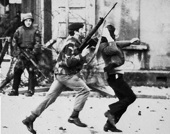
By Eamon McCann (for the Derry Journal)
Standing at the Bloody Sunday monument in the Bogside listening to Gerry Duddy recite the names of the wounded and the dead, my thoughts turned to Robert Johnston and Richie McKinney.
John Johnston and William and Gerard McKinney were among the names listed in the bleak litany of the dead of January 1972. Two Johnstons, three McKinneys, I mused. Robert Johnston and Richie McKinney had joined their namesakes as victims of the Paras in September the same year.
Not just of the Paras, but of the same group of Paras - Mortar Platoon, Support Company, First Battalion, the Parachute Regiment.
Robert and Richie were killed on the Shankill in Belfast at around 9.30 in the evening on September 7th, 1972. There had been rioting in the area earlier. All the civilian evidence was that calm had been restored by the time the Paras moved in.
Medical evidence to the inquest told that Mr. Johnston, a single, unemployed man from Sydney Street West, had died from a high velocity bullet which struck him on the back and ripped through his heart before exiting from his chest.
A number of witnesses described Mr. Johnston seemingly drunk and waving his arms around at the junction of Berlin Street and Weir Street. Sarah Anderson of Silvio Street said he was shouting, “I walked these streets in my bare feet in the Thirties”.
William Greer, manager of the Wee House bar on Berlin Street, said: “I heard him shout, ‘The meek shall inherit the earth.’ Then I heard a single shot...The old man staggered forward and fell.
“He was a totally harmless man,” said Sarah Anderson.
Richie McKinnie, an engineering worker at Mackies, was shot as he drove slowly along Matchett Street, avoiding debris from the earlier riot. Medical evidence suggested that the bullet shot off his thumb as it gripped the steering wheel and then fragmented, lacerating the arteries of his chest and entering his lung.
McKinnie had been driving his brother, Thomas, on a tour of some of their old Shankill haunts.
Thomas had arrived from Canada the previous day on his first visit home in 31 years. He had wanted to go out, look around the area, once the rioting had stopped.
He recalled for the inquest “a flash of white as the windscreen shattered...Ritchie said, ‘Oh, I’m hit’, and fell over...I got my arms around his chest. I could feel that my hands were wet...I started to holler...”
Eyewitnesses, including George Cree, Joe Thompson and David Beck of Matchett Street and Evelyn McIntyre and Joyce Cummins of Jersey Street, were insistent that there had been no gunshots from the car or its vicinity.
“I wish to add,” said Joseph Thompson, “that I have known the deceased Ritchie McKinnie all my life, and a more respectable person you couldn’t meet.”
All the civilian witnesses claimed that the Paras had been abusive before and after the shooting, shouting “Orange bastards”, jeering that “at least the IRA are men”, and directing obscenities towards women. One witness claimed that they had been shouting at residents, “Take in your flags, you are not fit to live under it.”
Four soldiers, A, B, E and J, gave statements to the Royal Military Police which were presented to the inquest. Following the pattern of Para statements to the Bloody Sunday Tribunal, all told of their unit coming under unprovoked fire and of aimed shots being returned at armed men.
Soldier A’s account of the killing of Robert Johnston depicted two gunmen opening fire in Berlin Street with Sterling sub-machine guns.
“I saw the muzzle flashes...and heard the rounds strike near me.”
He said he fired two shots in return and saw one of the gunmen fall.
Soldier J said that he had shouted at the driver of a slow-moving car on Matchett Street to turn his lights off, that he had heard a gunshot and seen a muzzle flash to the left of the car, that a man emerged from the car carrying a rifle which he pointed at the soldiers, that he’d then shot him.
Hundreds attended a protest picket at Tennent Street RUC station the following day.
An unofficial inquiry at West Belfast Orange Hall five days later concluded that there was a “desperate need for an independent judicial inquiry.”
But no judicial inquiry was forthcoming.
As the bloodiest year of the Troubles stumbled on, the Unionist politicians who had initially spoken out let the matter drop. The deaths didn’t fit into their preferred narrative. Demanding tougher army action against Republicans, they could hardly highlight army killings on the Shankill.
It wasn’t until Seamus Treacy, representing a number of the Bloody Sunday families, pressed Lord Saville (unsuccessfully) to take the killing of Robert and Richie into account that the incident again figured in reports.
Getting away with it
One of the reasons the Paras were confident they could get away with murder in the Bogside was that they’d previously gotten away with it elsewhere. One of the reasons they felt free to kill two on the Shankill is that they had (or thought that they had) gotten away with killing 14 in Derry.
In taking the side of the Paras in relation to Bloody Sunday, Unionist leaders facilitated the killing by the same force of some they will have regarded as their own. In their eagerness to do down the other side, they failed to vindicate the interests of their own side.
Their rubbishing in advance of the Saville report shows that they have learnt no lesson. But the people they aim their propaganda at, whom they urge to regard the killing of Bogsiders as of no account, should, in their own interests, take a different view.
All seeking the truth about Bloody Sunday could usefully keep this perspective in mind.
![[Irish Republican News]](https://republican-news.org/graphics/title_gifs/rn.gif)
![[Irish Republican News]](https://republican-news.org/graphics/title_gifs/harp.gif)

